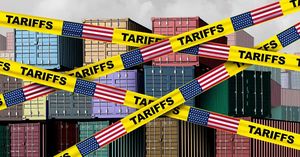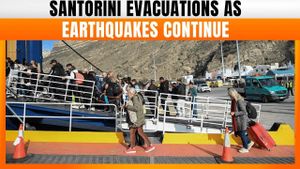President Donald Trump stunned the world on Tuesday with his bold proposal to take ownership of the Gaza Strip, aiming to reshape the beleaguered region's future. At a press conference held with Israeli Prime Minister Benjamin Netanyahu, Trump expressed his ambition to economically develop Gaza, emphasizing his plans for destruction and reconstruction of the land.
During the joint press conference, Trump stated, "The U.S. will take over the Gaza Strip, and we will do a job with it too. We’ll own it." This marks a significant shift from the two-state solution framework long supported by U.S. administrations. The president described Gaza, which has been battered by years of violence and destruction, as “a hellhole” and “a big pile of rubble” due to the recent Israeli bombardments.
Trump's proposal, which includes relocating the entire population of Gaza, allegedly aims to offer them “a new and beautiful [portion of] territory” where they can thrive away from violence. “I don’t see how they could want to stay. If we can find a beautiful region to permanently resettle people, they would be happy and have the chance to live peacefully now,” he asserted, implying the residents should accept resettlement offers from neighboring countries such as Jordan and Egypt.
Despite Trump’s optimistic claims about the reception of his proposal, both Egypt and Jordan have categorically rejected the idea, fearing it would destabilize their countries. Trump insisted the two nations would come around, stating, “I trust King Abdullah and the general who’s president of Egypt will open their hearts and provide the type of territory we need to make this happen.”
Netanyahu lauded Trump's initiative, calling him Israel’s “greatest friend” and endorsing the U.S. plan as worth serious attention. “You’ve picked up right where you left off,” Netanyahu remarked, reminiscing about Trump’s previous pro-Israel stances during his presidency. The Israeli Prime Minister expressed belief the proposal could “change history.”
Criticism has erupted from Palestinian leaders, with comments from Hamas representative Sami Abu Zuhri condemning Trump’s suggestions as reckless, stating they could ignite chaos throughout the region. Palestinian UN ambassador Riyad Mansour emphasized the importance of respecting Palestinian desires to retain their land, asserting, "Our homeland is our homeland."
Trump defended his vision, arguing the status quo “has been the same for 100 years” and claimed other world leaders had shown enthusiasm toward his plans. He hinted at the possibility of sending U.S. troops to Gaza to oversee the reconstruction: "If necessary, we’ll do it," he stated, diverging from his earlier reluctance to deploy military forces abroad.
Notably, the dynamics surrounding Gaza are fluid, with current Israel-Hamas negotiations on the ceasefire and hostage exchanges underway. The U.S. involvement suggested by Trump ignites questions about the logistics of rebuilding Gaza and the fate of the nearly two million residents still living there.
With the Israeli military's offensive resulting in tens of thousands of casualties and widespread destruction, comments on infrastructure and economic development abound. Trump described Gaza as presenting “incredible potential,” comparing it to the “Riviera of the Middle East,” claiming the U.S. would create thousands of jobs and rebuild the territory. "We're going to develop it and create thousands and thousands of jobs,” he declared. This rhetoric echoes Trump's past ventures as a real estate mogul, continuously engaging with the idea of real estate potential even amid humanitarian crises.
The fallout from this proposal could create ripples across the Middle East, as nations assess their positions on the divisive topic. Diplomatic efforts must navigate the treacherous waters, especially as Arab nations reiterated their commitment to the Palestinian cause, opposing any moves to displace residents.
International opinion is sharply divided as Trump and Netanyahu forge stronger ties against opposition from Palestinian representatives and regional actors. Following the press conference, concerns persist over the plan's feasibility, especially considering the humanitarian crisis still impacting Gaza's residents.
The combination of U.S. military involvement and efforts to reshape demographics raises ethical and political challenges, indicating complex repercussions looming on the horizon. If enacted, this plan may challenge decades of established diplomatic norms and provoke intense scrutiny from various stakeholders.
This latest maneuver from the Trump administration aiming to control Gaza exemplifies the enduring nature of the Israeli-Palestinian conflict. Each action taken under this proposal will not only impact the lives of Gazans but also affect the geopolitical balance within the region.
Trump also hinted at forthcoming announcements concerning the West Bank, promising clarity to stakeholders and establishing the stage for what may be projected as comprehensive U.S. policy shifts toward the entire Israeli-Palestinian situation.



